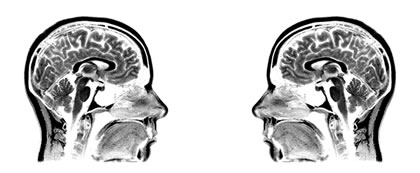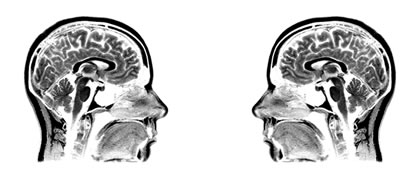
Cognitive neuroscience – essentially brain scanning – has become all the rage in psychology and related fields. Given the headlong rush by, well, practically everyone, into cognitive neuroscience I still entertain a quaintly unfashionable stance: I’m sceptical. My scepticism is not total though, many cognitive neuroscientists claim that there are many exciting findings to come. They’re probably right, but while neuroimaging can certainly tell us much about the brain, there’s reason to believe it hasn’t told us much about the mind. To understand what I mean by this we need to go back to basics by asking what research is for.
“Does cognitive neuroscience really have the power to distinguish between psychological theories?”Like all scientists, psychologists are continually knocking out new theories to explain the way we think and behave. One of the most important functions of research is its ability to differentiate between two theories. If research doesn’t at least provide a clue one way or the other then theoretically, and so practically, it’s a waste of time. Does cognitive neuroscience really have the power to distinguish between psychological theories? Is it any use to a cognitive psychologist?
A critic’s view
Max Coltheart is Professor of Psychology at Macquarie University in Australia and in a recent journal article he wonders whether cognitive neuroscience has really told us anything useful about the mind so far (Coltheart, 2006). It’s important to realise that his emphasis is on the mind, as in cognitive processes, as distinct from the brain, as in physiological processes.
“Neuroscience’s strength is in physiological processes…”There’s no doubt the mind’s cognitive processes are a function of the brain’s physiological activity but these two things are nevertheless (currently) separate questions. Cognitive neuroscience’s strength is in physiological processes, and as imaging technology improves, so will the importance of its findings in this area. But, again, why should a psychologist care that much which part of the brain lights up in a scanner, if the mind’s functioning is still so far removed from our understanding of its physiology?
An example
All this can be difficult to grasp in abstract. Take one of Coltheart’s examples. Suppose you’re a psychologist interested in how people work out what other people are going to do. Their intentions. Suppose there are only two competing theories that you’ve got to choose between:
- ‘Simulation theory’: I literally run a crude simulation of your mental state in my own mind. From this I try and work out what you’re going to do next.
- ‘Theory theory’: I create a theory about you, then try to work out what you’re going to do from that.
A recent neuroimaging study claimed to be able to distinguish between these two theories. Ramnani and Miall (2004) put people in the brain scanner, got them to carry out certain tasks and predicted that if a particular part of the brain was activated it supported the first theory, and if another, then it supported the second. What actually happened was nowhere near this simple. Despite the claims of the study’s authors, Coltheart argues that actually neither theory was substantially supported or refuted by the findings.
“…evidence from cognitive neuroscience fails to distinguish between theories.”This is just two theories and one study – not exactly a scathing criticism of the whole of cognitive neuroscience. But Coltheart does run through four other examples where evidence from cognitive neuroscience fails to distinguish between theories. Again, remember that we’re talking about relatively high level psychological theories here, not low-level physiological processes.
Coltheart goes on to pull quotes from a range of people who argue that, in principle, neuroimaging is useless for psychological theory and understanding of the mind. Here’s a good computing metaphor:
“No amount of knowledge about the hardware of a computer will tell you anything serious about the nature of the software that the computer runs. In the same way, no facts about the activity of the brain could be used to confirm or refute some information-processing model of cognition.” (Coltheart, 2004, p.22)
I personally don’t know enough about cognitive neuroscience to argue whether or not this statement is true, but it certainly has intuitive appeal. Considering the enormous quantity of money going into cognitive neuroscience right now, it seems unlikely this would be a majority view amongst psychologists. Not that scientist are slaves to money, of course…Ahem…
 References
References
Coltheart, M. (2004) Brain imaging, connectionism and cognitive neuropsychology. Cognitive Neuropsychology, 2, 21-25.
Coltheart, M. (2006). What has functional neuroimaging told us about the mind (so far)? Cortex, 42(3), 323-31.
Ramnani, N., & Miall, R. C. (2004). A circuit in the human brain for predicting the actions of others. Nature Neuroscience, 7, 85-90.

